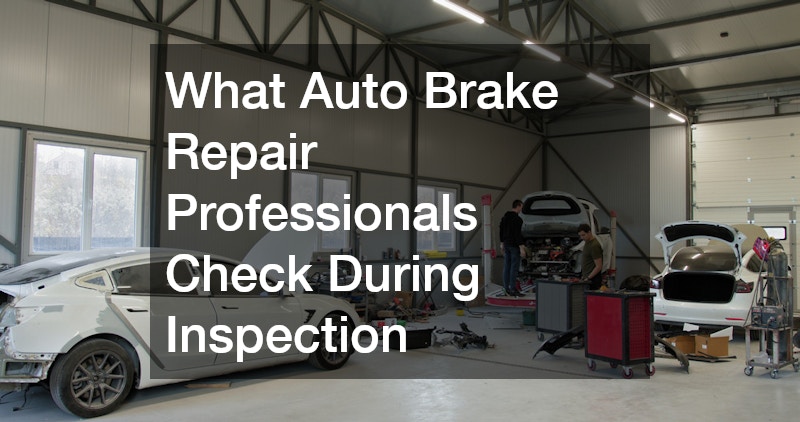
In this article, we will explore the critical checkpoints that auto brake repair professionals assess during a vehicle inspection. Understanding these elements can help vehicle owners maintain their brakes effectively and ensure safety on the road.
The brake system of a vehicle is primarily composed of several critical components that ensure effective stopping. Among these, the brake pads play a vital role by applying friction to the rotors to halt the vehicle's motion.
Video Source
Technicians meticulously check the rotors, which are discs that the brake pads press against to create the necessary friction, ensuring they are not warped or excessively worn.
Another key component is the brake calipers, which house the brake pads and are responsible for pushing them against the rotors when the brake pedal is pressed. Professionals inspect these components for signs of wear or damage, as faulty calipers can lead to uneven braking and reduced safety. Furthermore, the professionals examine the brake fluid reservoir to ensure that the fluid levels are adequate and that the fluid itself is in good condition, free from contamination.
To accurately assess the wear and tear of brake pads, technicians use specialized tools such as micrometers and calipers to measure the thickness of the pads. The industry standard often requires that minimum thickness be maintained to ensure optimal braking performance. If the pads are found to be below the recommended thickness, they will likely need replacement to prevent further damage to the rotors.
Technicians also look for visual signs of wear, such as uneven wear patterns, which could indicate issues with the calipers or suspension system. They may inspect the surface of the pads to determine if they exhibit any glazing or cracking, which can affect performance. Additionally, experienced professionals rely on auditory clues; they listen for squeaking or grinding noises that often signify worn-out brake pads.
Brake fluid is a critical hydraulic fluid that transfers the force from the brake pedal to the brake components, making it vital for effective braking performance. Its importance cannot be understated, as the right brake fluid ensures that brake pressure is maintained throughout the system. Technicians routinely check the fluid level in the reservoir, as low levels can indicate leaks or depletion due to evaporation.
During the inspection, professionals also assess the quality of the brake fluid. They may use a moisture tester to evaluate the fluid’s water content, as the accumulation of moisture can significantly affect braking performance and lead to brake fade. Additionally, the color of the fluid is examined; clean brake fluid should be clear or light amber. If the fluid appears dark or contaminated, it may signify the need for a complete flush and replacement to restore optimal braking function.
Checking for leaks in the brake lines is crucial because any loss of brake fluid can lead to a dangerous situation where the vehicle may not stop effectively. Technicians carefully inspect all brake lines and connections for signs of fluid seepage or damage. A small leak can lead to significant consequences, making it essential to identify and address these issues promptly.
Air in the brake lines can also compromise the braking system. When air gets trapped in the hydraulic system, it can lead to a spongy brake pedal feel and reduced braking effectiveness. This condition, known as “brake fade,” can significantly impair a driver’s ability to control the vehicle, especially in emergencies. Professionals utilize techniques like brake bleeding to remove any trapped air from the system, ensuring optimal brake response.
Furthermore, the presence of both leaks and air in the brake lines can indicate underlying problems that may need more extensive repairs. Neglecting these inspections can not only result in brake failure during operation but could also escalate into more extensive and costly repairs down the line. Consistent attention to the integrity of the brake lines contributes significantly to road safety and vehicle longevity.
Understanding what auto brake repair professionals check during an inspection not only helps in maintaining your vehicle but also ensures your safety. Regular brake inspections are essential for road safety, so be proactive in addressing any potential brake issues.
